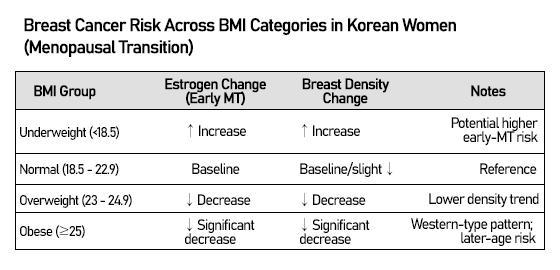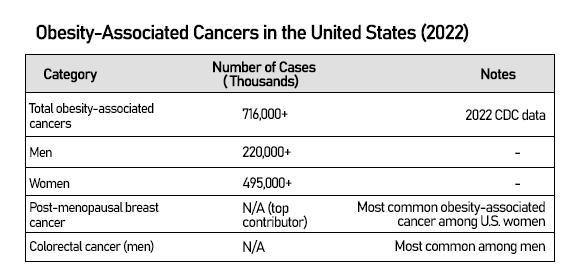
SEOUL, November 21 (AJP) - Overweight and obesity are the most common drivers of post-menopausal breast cancer in American women — but for Koreans, new evidence suggests the opposite: being underweight may be the greater risk factor.
New data highlight that breast-cancer risk in Korea follows a markedly different biological pathway from that of Western populations, where excess body fat typically fuels tumor development after menopause.
In Korea and Japan, breast-cancer incidence peaks in women’s late 40s — nearly two decades earlier than in the United States — and researchers say this divergence may stem from hormonal patterns unique to lean Asian women entering menopause.
A study led by Kangbuk Samsung Hospital and Seoul Asan Medical Center tracked 4,737 Korean women for seven years and found that underweight participants (BMI <18.5) experienced a temporary surge in estrogen and breast-tissue density during the early menopause transition. Both factors increase breast-cancer risk. The findings were published in Breast Cancer Research in October 2025.
Korea’s national cancer registry recorded 29,729 new breast-cancer cases among women in 2019, with a median diagnosis age of 52.8. Women in their 40s accounted for the largest share. Incidence has risen 4.8-fold since 2000, underscoring an age-specific vulnerability among Asian women.

Breast density is another key differentiator. Korean women have among the highest rates of dense breasts in the world — a characteristic that raises cancer risk and reduces mammographic accuracy. In Korea, dense-breast prevalence drops sharply from about 78 percent in the late 40s to 30 percent in the 50s. Western cohorts show only a modest shift, from roughly 47 percent to 44 percent. Researchers say these rapid hormonal and anatomical changes compress Asian women’s risk window into a narrower, younger age band.
Clinicians say lifestyle patterns may further amplify this vulnerability.
“Korean women tend to show much more extreme BMI distributions than Western women — they are often either very underweight or severely obese, with relatively few in the normal range,” said Shim Kyung-won, a family medicine specialist at Ewha Mokdong Hospital.
“Many girls and young women grow up under strong pressure to stay thin, which leads to unnecessary dieting and early exposure to hormone-regulating or weight-control medications. This frequent hormonal exposure at a young age can contribute to infertility issues and potentially raise breast-cancer risk later in life.”
Shim noted that Korean women frequently have higher body-fat percentages and more abdominal fat than Western women of the same weight because of carbohydrate-heavy diets and lower muscle mass, placing additional metabolic strain during their 30s and 40s.
American data show the opposite dynamic. According to the U.S. Centers for Disease Control and Prevention, more than 716,000 obesity-associated cancers occurred in 2022, including 495,000 among women. Post-menopausal breast cancer is the most common obesity-linked cancer in American women, driven by hormone-responsive pathways tied to excess fat.
Recent U.S. research has identified a biological mechanism behind this trend. Leptin — a hormone produced by fat cells — was found to promote estrogen receptor-positive tumor growth by increasing activity of stearoyl-CoA desaturase (SCD), a metabolic enzyme that fuels cancer cell proliferation and motility.

“Our data indicate that the combined upregulation of leptin and SCD identifies a subgroup of breast cancers with poorer recurrence-free survival,” the research team said. Blocking SCD “almost completely counteracted the pro-tumorigenic effects driven by leptin,” said Dr. Barone, suggesting the enzyme’s potential as a therapeutic target for obese ER-positive patients.
Korean clinicians say shifting family patterns may also be reshaping risk.
“We are seeing earlier menopause among younger women today,” Shim said. “Delayed marriage and childbirth, a rise in never-married women, shorter or absent breastfeeding, and increasing use of fertility treatments all contribute to greater hormonal fluctuation. Many young patients present with health issues linked to extremely unbalanced lifestyles.”
She added that “a growing number of underweight young women mistakenly believe they are overweight due to unrealistic beauty standards,” reinforcing the need for healthier weight perceptions.
These contrasting biological pathways show that American and Korean women face opposite risk profiles: obesity drives hormone-dependent breast cancer after menopause in the West, while low BMI may trigger hormone-density spikes that push Korean women into earlier cancer onset.
Copyright ⓒ Aju Press All rights reserved.




